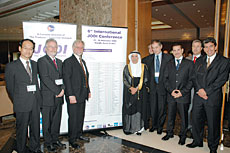RIYADH, 26 November 2006 — Ali Al-Naimi, minister of petroleum and mineral resources, said yesterday that the Organization of Petroleum Exporting Countries (OPEC) would cut oil output again to check rising fuel stocks in consumer nations and to restore stability in the global market.
Naimi said OPEC, at its meeting on Dec. 14, is all set to address the growing concerns of the energy exporting countries and will decide a future course of action. However, he said that oil prices were not a decisive factor every time.
The minister was speaking to journalists after delivering a keynote address at a high profile energy conference in Riyadh yesterday. More than 100 senior officials including energy experts from over 35 countries are participating in this two-day event entitled “International Joint Oil Data Initiative (JODI) Conference.”
The inaugural session was also addressed by Ambassador Arne Walther, secretary-general of the International Energy Forum (IEF); Fuad Al-Zayer, chief of OPEC’s Data Services Department; Bernard Savage from Eurostat; Susumu Kuramoto from the Asia Pacific Economic Cooperation (APEC); Jean-Yves Garnier from the International Energy Agency (IEA); Alvaro Rios Roca from the Latin American Energy Organization (OLADE) and Karoly Kovacs from the United Nations Statistical Division.
Asked about measures being taken by OPEC to stabilize the oil market and address the sharp fall in prices, Naimi said, “We will first assess the impact of the measures that were decided on at the Doha meeting last month and if they serve the purpose of bringing stability in the global market, then we will not act. But, if these measures fail, then further cuts cannot be ruled out.” He also referred to the oil stocks in the industrialized countries when asked about the high inventories in the US.
The continuation of stockpiles will be leading to an imbalance in supply and demand fundamentals, he said. At the Doha emergency meeting, OPEC responded to a 25 percent slump by cutting output by 1.2 million bpd from Nov. 1.
Naimi also downplayed a recent fall in the value of the dollar and rejected the idea that a weaker dollar would encourage OPEC to seek and justify high oil prices because its income from dollar-denominated oil sales has eroded.
Referring to the importance of JODI in his keynote speech, Naimi said, “The transparency of data and information relating to the oil market is one of the cornerstones of the relationship between oil producers and consumers.”
He added that the lack of transparent and reliable oil data has consistently been identified as an aggravating factor in the high volatility of oil prices, along with factors such as geopolitics and market speculation.
“After all, oil is, and will continue to be, the predominant source of the world’s energy and the most traded commodity for many years to come,” said Naimi, adding that Saudi Arabia “is currently active in data submission for this initiative and we are committed to providing the JODI database with the highest quality data possible.”
He also called on oil producing and consuming nations “to ensure complete, timely, reliable and sustained data submissions and allocate resources to do so.”
Naimi said that the lack of reliable data tends to distort economic decision-making, with damaging effects on global economic activities.
“This monumental effort (JODI) began among producers and consumers at the IEF’s seventh ministerial meeting in Riyadh in 2000 and I am proud to say that Saudi Arabia has been a driving force in this initiative.” The data initiative has developed very rapidly and has become the key topic at all energy forums.
“The governments of both energy-importing and energy-exporting countries as well as industry share a fundamental interest in having the best possible data and information at hand, when policy and investment decisions are made,” said Ambassador Walther in his speech. The IEF chief said that more than 90 countries representing over 90 percent of the global oil supply and demand are now submitting data to JODI.
“JODI is an international ambition translated into action and it is also a coordinated inter-organizational response to the political call for better data and increasing transparency that are important for investment decisions and energy security,” said Walther. Another speaker, Fuad A. Al-Zayer, chief of OPEC’s Data Services Department, said, “JODI continually raises the industry bar with regards to data transparency, harmonization, quality and timeliness and at the same time helps strengthen producer-consumer dialogue.”
While extending full support to JODI, he pointed out that OPEC continues to devote much effort to support such initiatives and widen energy dialogue. To this end, Al-Zayer noted that the most recent result of this was the establishment of energy dialogues between OPEC and the EU as well as with China, Russia and many other stakeholders.
“OPEC seeks to achieve a secure, stable and orderly oil market, a market where supply and demand are balanced and the necessary levels of investment as well as prices are acceptable to all,” he said.










